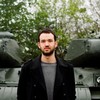Hilary Benn
Advertisement
Advertisement
And then there's what he actually said. Hilary Benn has form here: he voted for the 2003 war in Iraq (making him far more responsible for the rise of Isis than some of the people who will die in the airstrikes he's so passionately promoting) and the disastrous 2011 air war in Libya. Much of his speech is familiar invocation of the just war doctrine: laying out the brutality of Isis, as if the eight British jets we're sending could put an end to it; asking "what message would [not acting] send?", as if the self-image of the British state were worth a single innocent life.But along the way Benn made a few comments that were really startling, both callous and clunky. He mentioned the inevitability of civilian casualties only once. "Unlike Daesh", he said, "none of us today act with the intent to harm civilians. Rather, we act to protect civilians from Daesh, who target innocent people." Well, that's fine then. As if our sincere good wishes mean anything when we're lobbing bombs at a city from 30,000 feet.He declared that the United Nations had been founded because, "we wanted the nations of the world working together to deal with threats to international peace and security," rather than with the goal of abolishing wars altogether – wars like the one Hilary Benn MP helped start in 2003, which led to the one he helped start last night.As if the self-image of the British state were worth a single innocent life.
Advertisement
It's a very strange comparison to make, especially as he aligns himself with a Tory war. During the Spanish Civil War, thousands of British left-wingers did indeed join up to fight against the fascists, but Benn's new friends weren't great supporters of the effort. George Orwell writes in The Lion and the Unicorn of the "frightening spectacle of Conservative MPs wildly cheering the news that British ships, bringing food to the Spanish Republican government, had been bombed by Italian aeroplanes.""We are here faced by fascists. […] And what we know about fascists is that they need to be defeated. And it is why, as we have heard tonight, socialists and trade unionists and others joined the International Brigade in the 1930s to fight against Franco. It is why our party has always stood up against the denial of human rights and for justice. And my view, Mr Speaker, is that we must now confront this evil."
Advertisement
